|
Greenway
| Glenora | Neelin | Louise
Siding | Holmfield
| Enterprise | Lena | Anderson's
Siding
| Wakopa
Wakopa
The arrival of rail service prompted the rebirth of
Wakopa as a village, although the location was just slightly north of
the original site, the community and the name remained. A station,
elevator and store were soon constructed, and although the population
and commercial activity remained small, the importance to local farm
families was immense. 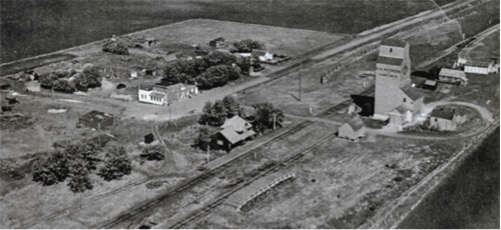 The store offered virtually everything a family would need. A blacksmith was an essential service in the days when farm machinery had to be repaired locally. The railway could deliver bulk goods such as coal and take both livestock and grain to market. 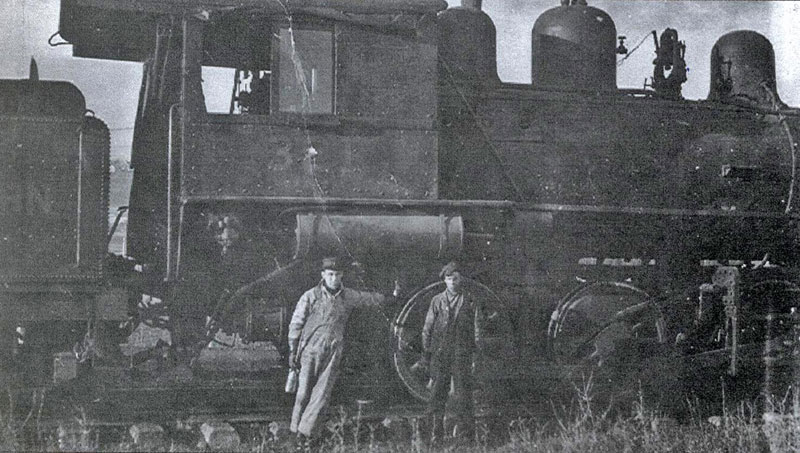  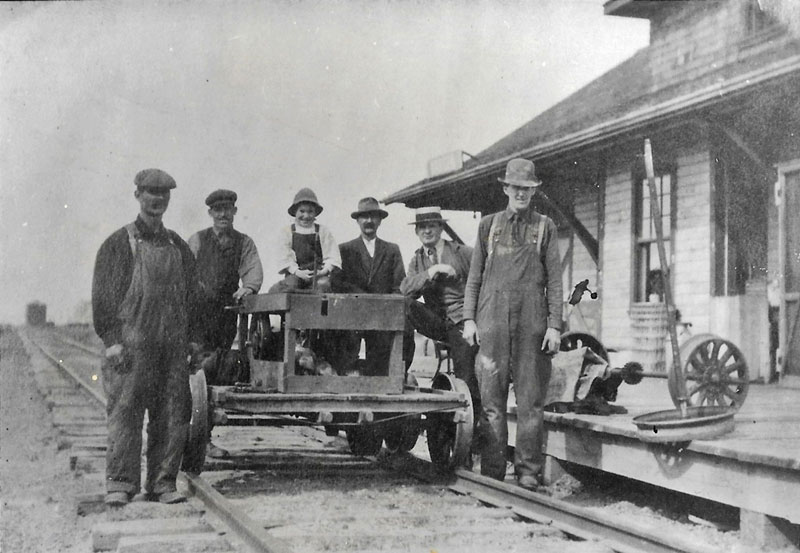 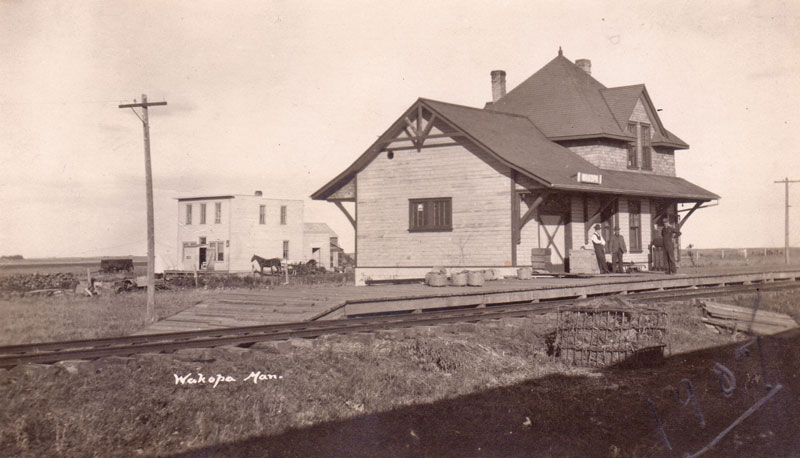 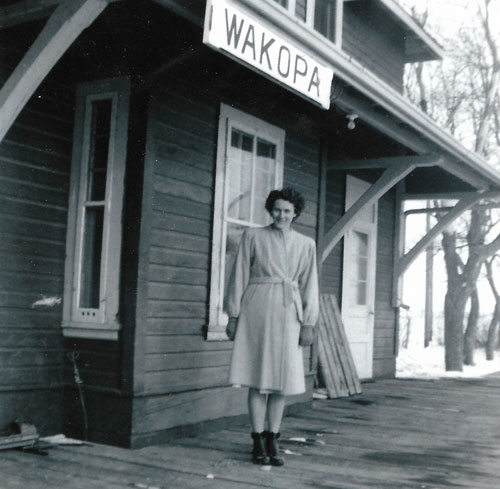 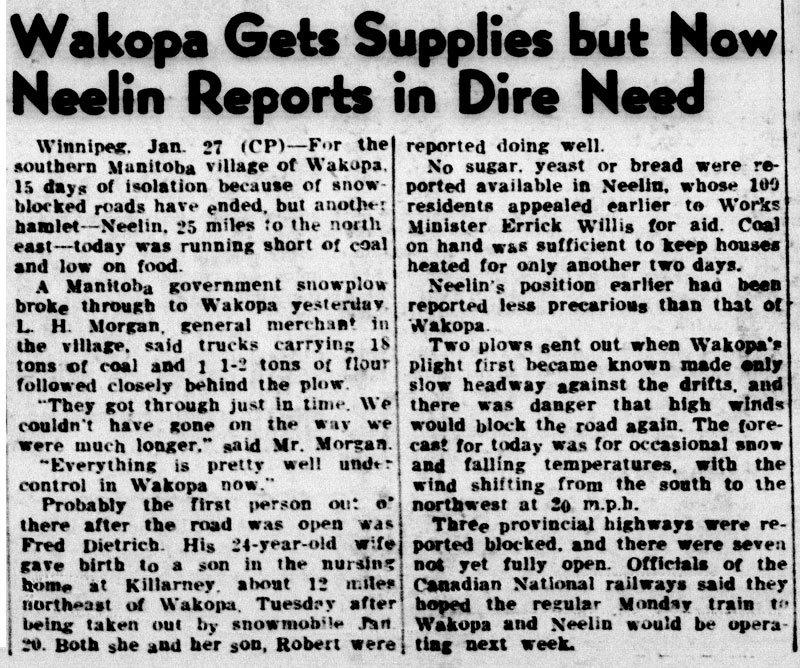 Winnipeg Free Press, Jan. 27, 1949 The Wakopa Line was in the news quite a bit in 1949, when unprecedented snowfall caused problems, especially in January. The railroad from Neelin to Deloraine long proved to be unprofitable. As early as 1939 the C.N.R. applied to the Board of Transport to have it abandoned from Louise Siding to Deloraine, but the application was denied. Twenty years later in 1959 the CNR applied again, this time with success. The line was abandoned. In 1960 the track was removed. In 1978 the Greenway Neelin section was abandoned. For more on the Wakopa story... http://www.virtualmanitoba.com/wakopa/
The End of the Line
It was called the The Wakopa Line because that was where it ended - for a time. For the first years of its operation there was no way for the engines to turn around and they had to travel in reverse all the way back to Greenway, where a "Y" allowed them to turn east towards Morris and Winnipeg or west towards Belmont, Brandon or Virden. Before long the line was extended a short distance west of Wakopa to Adelpha where a Y allowed for turning around. Some years after that the line was completed as far as Deloraine, allowing connections to Melita and the southwest corner, as well as a connection to Brandon. 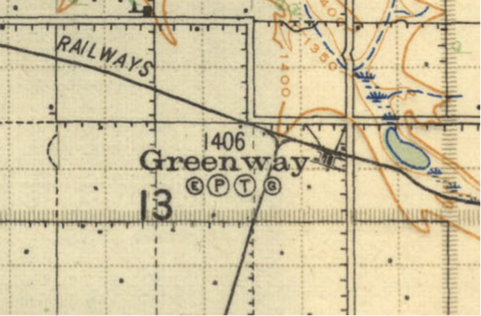 For now we'll end our story at Wakopa The railroad from Neelin to Deloraine long proved to be unprofitable. As early as 1939 the C.N.R. applied to the Board of Transport to have it abandoned from Louise Siding to Deloraine, but the application was denied. Twenty years later in 1959 the CNR applied again, this time with success. The line was abandoned. In 1960 the trackage was removed. In 1978 the Greenway Neelin section was abandoned. The loss of this rail connection had a tremendous impact on the communities it served. First and foremost it meant that farmers had to travel much farther to market their grain. For villages like Greenway, Glenora, Neelin, and Holmfield, there had already been a steady decline in the numbers of railway personnel that lived in those communities, but the loss of the local elevator removed one more reason for a farm family to come to town. That along with the closure of local schools lead to the closure of stores and any most remaining commercial activity. Ongoing rural depopulation was just another sign of the times. And yet, with the exception of sidings at Louise, Enterprise and Anderson, which were the first to close, some of the other villages are still standing. There may not be much commercial activity, but there is still a sense of community. Sources: Come into our Heritage - R.M. of Argyle 1882 - 1982, Argyle Centennial History Book Committee Gleanings of the Past: Glenora Community Boosters History Book Committee, Beckoning Hills Revisited - Pioneer Settlement Turtle Mountain Souris - Basin Areas - Boissevain History Book Committee, 1981 Holmfield: "By the Old Mill Stream." A History of the Village of Holmfield & District, 1982. ?
|
